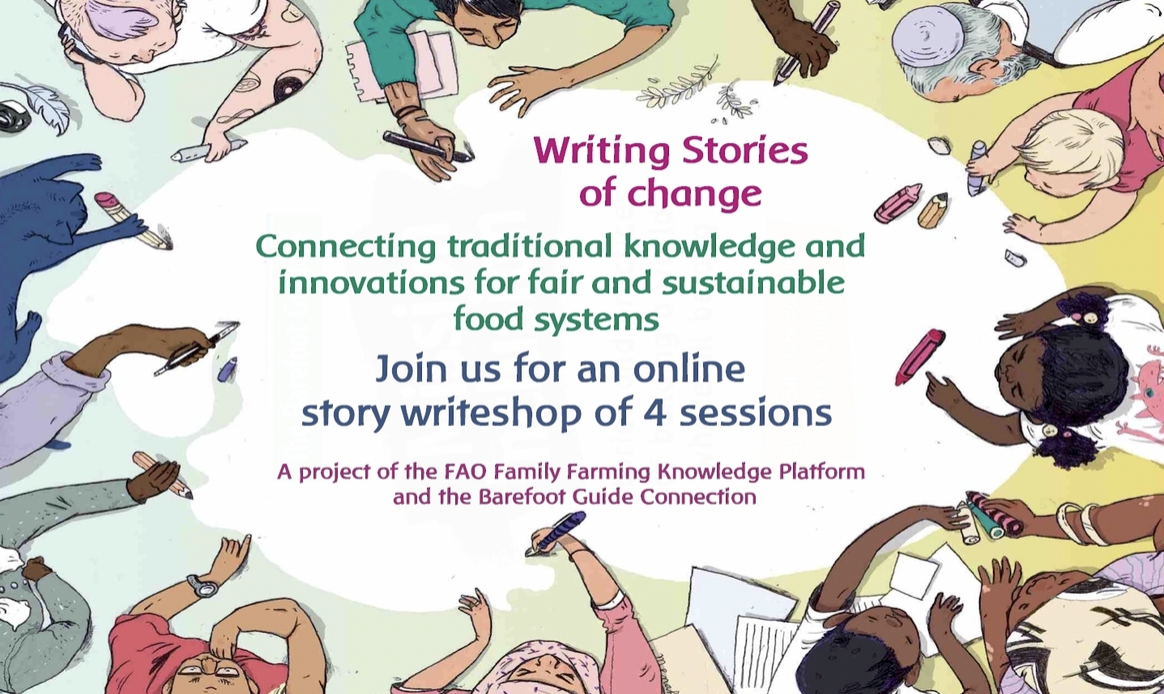FAO Family Farming & Barefoot Guide Connection

![]()
Learn to Write Stories of Change at a Writeshop on “Connecting traditional knowledge and innovations for fair and sustainable food systems”.
4 x 3.5 hour Sessions | 25, 26, 27 October & 1 November 2021 | 7 AM to 10.30 AM GMT
The Food and Agriculture Organization (FAO) is a specialized agency of the United Nations that leads international efforts to defeat hunger. Our goal is to achieve food security for all and make sure that people have regular access to enough high-quality food to lead active, healthy lives. With over 194 member states, FAO works in over 130 countries worldwide. We believe that everyone can play a part in ending hunger.
Join us in creating a #ZeroHunger world.
The Family Farming Knowledge Platform gathers digitized quality information on family farming from all over the world; including national laws and regulations, public policies, best practices, relevant data and statistics, researches, articles and publications.
It provides a single access point for international, regional and national information related to family farming issues; integrating and systematizing existing information to better inform and provide knowledge-based assistance to policy-makers, family farmers’ organizations, development experts, as well as to stakeholders in the field and at the grassroots level.
Why family farming?
Family farming is the predominant form of agriculture both in developed and developing countries. There are over 500 million family farms in the world. Family farmers range from smallholder to medium-scale farmers, and include peasants, indigenous peoples, traditional communities, fisher folks, mountain farmers, pastoralists and many other groups representing every region and biome of the world. They run diversified agricultural systems and preserve traditional food products, contributing both to a balanced diet and the safeguarding of the world’s agro-biodiversity. Family farmers are embedded in territorial networks and local cultures, and spend their incomes mostly within local and regional markets, generating many agricultural and non-agricultural jobs. All the characteristics above mean that family farmers hold the unique potential to move towards more productive and sustainable food systems if policy environments support them in this path.
Who are the Family Farming Knowledge Platform Contributors?
Hosted by FAO, the Platform benefits from the active collaboration of its contributors including Governments, United Nations Agencies, Farmers’ Organizations, Research centres and Academia with the common goal of identifying opportunities and gaps to promote a shift towards more equal and balanced development.
How to collaborate with the Platform?
The Platform welcomes contributions of all interested entities (such as Research Organizations, Universities, Non-Governmental Organizations, Development Agencies and Farmers’ Organizations) willing to participate in the project by sending factual, notable, verifiable (with cited sources) and neutrally presented content.
Who are the intended users?
The Platform is intended for a wide range of users, from Government Officers to Farmers’ Organizations, from Academia to Civil Society and Non-Governmental Organizations, all of which need access to qualified knowledge on family farming and related topics.
What are the potential benefits of using the Platform?
Using the Platform as a worldwide knowledge reference on family farming can assist policy makers and other stakeholders by facilitating policy discussion, policy design and decision making on family farming. Easy online access to programmes, legislation, updated statistics, publications, lessons learned, and initiatives fosters knowledge and information dissemination for concrete actions and policy making in support of family farming.
What is this Writeshop?
All over the world, there are thousands of stories of distinctive work carried out anonymously by family farmers, including women and youth, on successful transitions to more inclusive, sustainable and fair food systems. These stories are based on co-creation and the sharing of traditional knowledge and innovations that are helping to make food systems sustainable, leaving no one behind.
This writeshop, held in the United Nations Decade of Family Farming, is a creative process through which to identify, recognize, write and share stories and experiences from young people, women, farmers, small-scale producers who work to promote, improve and strengthen family farming and achieve prosperous and inclusive rural societies.


